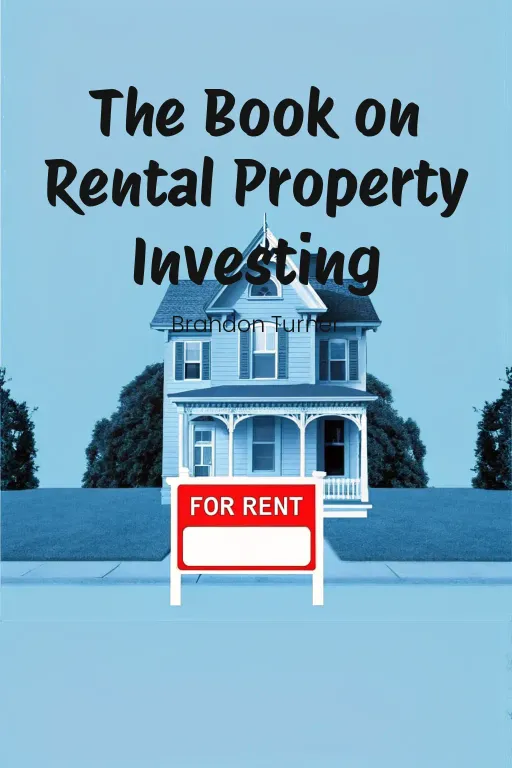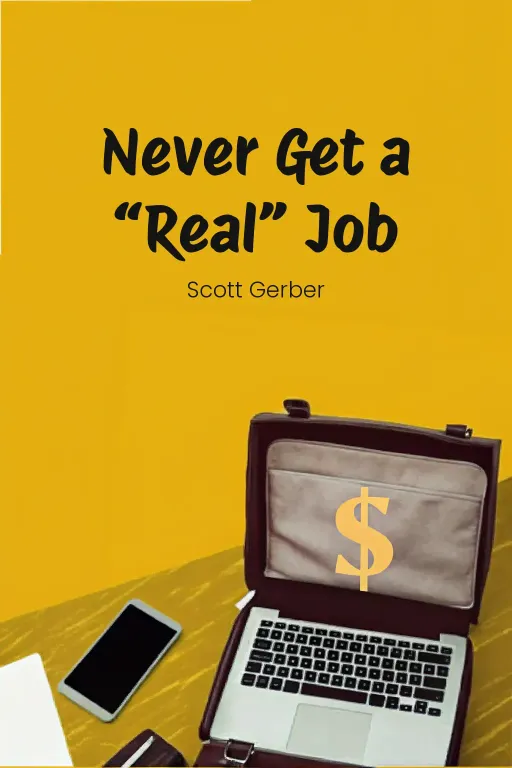
Escape the Grind: Build Your Dream Life Now
Podcast by Let's Talk Money with Sophia and Daniel
How to Dump Your Boss, Build a Business and Not Go Broke
Introduction
Part 1
Daniel: Hey everyone, welcome back! Let's kick things off with a question: What pops into your head when someone says, "Get a real job"? Is it stability, security, maybe even a sense of accomplishment? Well, today we're shaking things up, because Scott Gerber's here to challenge those assumptions and everything we think we know about the "traditional" career. Sophia: Exactly—and let’s be real, Daniel, that "real job" can often feel like a gilded cage for a lot of people. Gerber’s Never Get a ‘Real’ Job completely flips the script. He argues that entrepreneurship is the route to genuine freedom, even if it means rewriting all the rules. I like that idea! Daniel: Absolutely! In his book, Gerber “really” doesn't hold back. He gets right to the core of the problems with traditional career advice, outdated education models, and even misunderstandings we have about what financial stability “really” means. Instead, he gives us a practical, no-nonsense plan, based on his own journey, to take control and redefine success on our own terms. Sophia: Okay, so here's what we're going to do today—especially for anyone who's felt trapped in the daily grind or just dreams of more. First off, we're going to break down the myth of the "real job" and show why it's not the safety net we all think it is. Then, we'll dig into the practical steps for launching a business, starting from zero—no handouts, no easy routes. And finally, we’re diving into the mindset, the effort, and the strategies you need to not just stay afloat, but “really” kill it in the messy world of building something yourself. Daniel: Think of this as the ultimate guide to breaking free and creating a life that actually works for you. So, let's dive in and get started!
Challenging Traditional Employment
Part 2
Daniel: So, about shaking things up a bit, let's start by talking about the illusion of security that’s tied to having a “real” job. Most people see the 9-to-5 world as this beacon of stability, right? You graduate, get a degree, land a decent job with benefits, and then, boom, you're set for life. But Gerber doesn't just give this idea a little nudge; he basically throws the whole thing out the window, saying, "Hey, wake up! That safety net? It's full of holes." Sophia: Exactly! And that's what “really” resonates, isn’t it? It’s not just a few isolated cases of people slipping through the cracks; it feels like the whole system is about to collapse. Take Alex, for example. The political science grad stuck in a dead-end admin job. Four years of studying diplomacy and legislation, just to end up managing someone else’s calendar and stressing over student loan interest. If that's what they call stability, I'd rather try my luck juggling chainsaws, honestly. Daniel: Alex's story “really” embodies what Gerber calls a "broken promise." We’ve been told to just blindly trust in degrees and corporate jobs, but that framework just doesn’t hold up anymore. Sure, the job offer looks fantastic on paper, but then you see the fine print – underemployment, zero growth opportunities, and that soul-crushing monotony that just stifles creativity and drive. And, of course, we can’t forget the mountain of student loan debt pushing people into these roles just to survive. Sophia: Right, so you're trading your dreams and passions just to bring home a paycheck that barely covers the bills. That sounds less like a stable career and more like a fancy way of saying, "Welcome to survival mode." But the question is, if it's so obviously flawed, why do people keep falling for this trap? Daniel: That’s where societal expectations come into it. Generations of parents, teachers, mentors – they've all ingrained in us that a "real" job is the ultimate goal. Add in outdated educational systems that focus on theory instead of practical skills, and it's no wonder people feel cheated when they finally enter the job market. Gerber mentions how many graduates are thrown into the workforce without the actual skills employers need, like technical software knowledge or data analysis skills. Sophia: I know, the irony is amazing. You can spend four years dissecting rhetorical theory from Aristotle to TikTok, but you have no idea how to run a Facebook ad or even edit a basic promo video. And trust me, employers aren’t exactly lining up to hear about Aristotle. It’s this huge disconnect between what we're taught and what the real world demands. Daniel: And oh my god, don't even get me started on the so-called STEM guarantee. Gerber points out that even those fields, the supposedly safe bets – science, technology, engineering, and math – they're not immune to oversaturation and limited opportunities. Imagine getting a Ph.D. in physics, only to find yourself competing with hundreds of others for one single tenure-track position. So, a lot of them end up pivoting to something completely different, something that doesn't even value their expertise. Sophia: It’s a pretty brutal wake-up call, isn’t it? Decades of "follow the money," and now everyone's chasing careers that are either overcrowded or just not valued. It’s almost funny, funneling people into these paths just creates a bottleneck that kills the very guarantee of stability, that was promised in the first place. But it's not just about the lack of jobs, right? Daniel: Exactly. Even if you do get a job, the structure of those corporate roles can still leave you feeling completely unfulfilled. Gerber describes traditional employment as this creativity killer—it's a system designed to prioritize conformity and profits over personal innovation. He talks about endless meetings, pointless tasks, and micromanagement that just drains the entrepreneurial spirit out of even the most brilliant people. Sophia: Cue Rebecca, the overachieving MBA who diligently climbed the corporate ladder only to realize the view from the top wasn't all that inspiring. Instead of solving global problems or making a real impact, she's knee-deep in spreadsheets and office politics. It’s the classic "golden handcuffs" situation: great pay, but you're chained to a life where you’re just going through the motions. Daniel: And here's the kicker: Gerber argues that this isn't just a coincidence, it's by design. Those traditional roles are built to maintain the status quo, not to nurture your passions or unleash your creativity. The daily grind convinces people that their dreams are unrealistic or childish, all to make sure they don’t shake things up. Sophia: So, it's like being stuck on one of those airport moving walkways, but instead of moving forward, you're just stuck in place. Safe? Predictable? Low-risk? Sure. But also utterly stagnant. No wonder everyone's looking for an off-ramp. Alright, Daniel, let’s be real. If corporate jobs and even STEM careers aren’t the answer, then what is? Daniel: That’s where entrepreneurship comes into play—not as a quick fix, but as a fundamental shift in mindset. Gerber’s point is simple: instead of offering your skills to some company that undervalues and underutilizes them, why not invest in yourself? Just recognize that the traditional employment model is not just flawed—it's limiting your potential. By stepping outside of that, you take back control of your time, your creativity, and your future. Sophia: Control is the key word, huh? Looking beyond the fake safety nets and building real resilience on your own terms. But wow, it's a tough sell. Taking that leap takes guts, persistence, and, let's be honest, a level of accepting the unknown, that most people just aren't ready for. Daniel: Exactly, and Gerber doesn’t try to downplay that. He acknowledges the risks—but he also makes a “really” convincing argument that staying stuck in a so-called “stable” job might actually be riskier in the long run. It’s all about redefining what security means – because for today’s workforce, the only true safety net is being adaptable, innovative, and creating something of your own.
Building an Entrepreneurial Foundation
Part 3
Daniel: That critique really sets us up, doesn't it? Because if the traditional job market is so unpredictable, then what's the alternative? Gerber offers us a blueprint for building something more solid – an entrepreneurial foundation. And just to be clear, we're not talking about turning everyone into the next tech billionaire. This is about practical, down-to-earth stuff, starting with something a lot less glamorous: financial awareness. Sophia, where does Gerber even begin with that? Sophia: Exactly, where does he start? Daniel: He starts with a pretty blunt truth: you can't really launch a business if you don't know where your money's going, or worse, if you're too reliant on your next paycheck to think long-term. Financial awareness, according to Gerber, is about understanding your "life burn rate." That's basically the minimum amount of money you need each month to, you know, keep a roof over your head, eat, and just survive. It's the starting point for figuring out how realistic entrepreneurship is for you. Sophia: Right, because let’s be honest, most people seem to think entrepreneurship involves a pile of inherited cash, or investors just lining up to hand you money. “Spoiler alert”— that’s generally not how it works. So, knowing your burn rate helps you from, well, financial disaster. But Daniel, does Gerber get into specifics on how much you should be cutting back? Are we talking about skipping a few coffees per week, or, like, selling your car and living on instant noodles? Daniel: It’s somewhere in between, but probably leaning closer to the noodles! He really pushes for meaningful cuts. It's about questioning every expense and streamlining your lifestyle to match the limited resources you'll likely have at the beginning. For instance, Gerber highlights tools like Mint and NerdWallet to track your spending habits and see where your money's actually going. Seeing your daily coffee adding up to hundreds each month can be pretty eye-opening. And instead of waiting for some venture capitalist to save the day, it’s about saving that cash now and investing it in your own business down the road. Sophia: Ah, so instead of buying a five-dollar latte, you’re supposed to think, "Hey, that's five bucks closer to launching my organic dog sweater company"? Fair enough. But what about borrowing? Doesn't every entrepreneur claim their success story begins with getting a ridiculous loan? Daniel: Gerber argues that that's exactly the pitfall to avoid. People tend to overborrow, being too confident that their idea will take off overnight, which is seldom the case. Instead, he suggests bootstrapping—relying on your own resources, personal savings, and only taking out minimal loans if absolutely necessary. His reasoning is that, if revenue is low early on, excessive debt can quickly eat up any potential profits. Sophia: Exactly, we have all heard the stories, right? Where it's just start-ups sinking under unforeseen costs. Picture someone dropping half budget on fancy office furniture only to be stuck paying for a CEO chair when all they needed was something from IKEA. Daniel: Exactly! Or better yet, working from their couch for free. That’s where Gerber’s emphasis on lean strategies comes in: using what you have and minimizing unnecessary expenses. And that leads into his critique of traditional business plans. Sophia, how many pages do you think Gerber would suggest for a business plan? Sophia: Considering Gerber's no-nonsense approach? I'm guessing zero. Daniel: Close! He advises simplifying it to just one paragraph. Forget those 50-page spreadsheets and fancy binders that people use to impress investors. His argument is, nobody cares about a detailed business plan if the basic concept is flawed. Instead, he says, clearly state your core idea, your target audience, and how your product or service solves a real problem. Sophia: So, it's like an elevator pitch distilled down to its core. For example, say I want to start a subscription box service for cat owners. Instead of endless bullet points on branding and market penetration, I'd write: "Delivering curated toys, treats, and grooming essentials tailored for cat lovers who want to spoil their pets, from the comfort of their own homes." Done and dusted. Daniel: Exactly! And that's the brilliance of it – by focusing on clarity, you avoid overthinking and potentially getting stuck. Gerber would urge you to run with that idea immediately: test your market, engage with your customers, and adapt as you go. And when you realize your first box leaves out hairless cat owners? You quickly adjust without feeling like you’ve wasted months overplanning. Sophia: It works great in theory, – or, on a tiny piece of paper, apparently. But this seems dependent on building flexibility into every step. He’s encouraging action over perfection, right? Daniel: Exactly. He wants entrepreneurs to focus on rapid testing and evolution. Take Airbnb, for example. Gerber points out that they started incredibly small, renting out air mattresses in their apartment. They didn't invest in fancy offices or custom software at the start. Instead, they tested the waters, gathered feedback, and gradually built their platform into the global giant that we know today. Sophia: That's some serious "minimum viable product" thinking. But not everyone is in tech. How can this lean approach be applied to different types of businesses, especially where the initial costs feel unavoidable? Daniel: That's a great question. Well, he shows that it really comes down to resourcefulness. So, let's say you want to offer tutoring or consulting services. Instead of renting a dedicated office, you could use shared coworking spaces. Hiring a virtual assistant via a platform like Upwork is another option for delegating work without committing to full-time employees. Gerber’s message is clear: find the cheapest, scrappiest way to get started, and only scale when absolutely necessary. Sophia: Speaking of scaling smartly, what about our tragic baking buddy, Jake? All the planning and overthinking ruined him, right? Daniel: Oh, poor Jake. He’s Gerber’s cautionary tale about overcomplication. Imagine this: Jake spends ages drafting a 50-page business plan, takes out a massive loan, rents a fancy bakery space, and hires a huge team right off the bat. Then, turns out, customers don't show up. High overhead coupled with limited demand? The bakery goes bust within months. Sophia: Ouch. It’s like a rent bill starring as the villain in a Shakespearean tragedy. How would Jake have changed his approach if he'd listened to Gerber? Daniel: Well, for starters, he'd bake from home or rent a commercial kitchen, selling his goods at farmers' markets to gauge demand before committing to a physical store. It’s about starting small, assessing the market, and adapting accordingly. Jake could have completely avoided the debt trap if he'd embraced the lean, flexible strategies that Gerber advocates for. Sophia: So it’s less about baking cakes and more about baking logic into your entrepreneurial approach. Got it. But all this planning less sounds…chaotic. How do you balance everything by having a structure when running a business? Daniel: That’s where it gets interesting. Gerber doesn't dismiss planning entirely—he shifts the focus to adaptability and learning by doing. He ties this together with his formula of “Darwin + Murphy = Reality.” Success isn’t solely about following a perfect roadmap, it's about getting through each trial and error, quickly changing direction, and staying resilient when things go wrong. Sophia: This jogs my memory—remember that skincare entrepreneur? Stubbornly sticking to organic-only products backfired because customers prioritized convenience over purity. That is when they included affordable, convenient options. That change ended up saving the company. Daniel: Precisely, Sophia. That’s how you evolve—by reading the market and refining your approach. Gerber would say it perfectly by cutting through the noise and focusing on what really works. Building an entrepreneurial foundation isn’t about avoiding failure; it’s about using failure as fuel.
Sustaining and Growing a Start-up
Part 4
Daniel: So, now that we’ve covered the initial steps of launching a business, let’s dive into the real nitty-gritty of growing and sustaining a startup. This is where things get interesting. Gerber guides us through the journey from bootstrapping to maintaining a viable business, emphasizing resourcefulness, relationship-building, and the absolute necessity of adaptability. His key point is that entrepreneurship is not just a one-time event, but a whole way of life. Sophia: Exactly, Daniel. Because the stakes just get higher, don't they? Launching is one thing, but surviving in that competitive business world is something completely different. It's all about striking a balance between ambitious goals and being nimble enough to react, especially when you have limited resources or the market throws you a curveball. So, Daniel, let’s start with the essential mindset; what does Gerber say about it? Daniel: Well, he calls it the "start-up mentality," a blend of grit, innovation, and flexibility. It's all about being resourceful, embracing change, and creatively solving problems without draining your resources. A perfect example is Airbnb, where they used air mattresses in their living room during a conference because they were short on cash. That’s how Brian Chesky and Joe Gebbia planted the seeds for a billion-dollar company! Sophia: True, it wasn't all glitz and glamour from day one. I mean, they didn’t start by marketing luxury escape packages! They were literally selling breakfast cereal along with those air mattresses, asking for feedback and fine-tuning their service as they went. The story is quite different from the overnight success fairy tales we often hear from Silicon Valley. But Daniel, I wonder; doesn’t this mindset start to break down under the pressure of scaling up? Daniel: It could happen, which is why it's essential to build the right team and embrace flexibility. Gerber emphasizes the need for versatile people who can wear many hats and flourish in a constantly changing environment. There are no rigid roles in a startup. Anyone clinging to the mindset of "that's not my job" will definitely hold the business back. You have to build a culture where resilience and collaboration are key. Sophia: So, let me get this straight; you're saying I might have to play receptionist one minute and CFO the next? Sounds exhausting, but I can see how this makes for a dynamic team environment. And talking about connections, what about the power of networking? Gerber sees it as a gold mine for startups. What would that look like in practice? Daniel: For Gerber, networking is not just swapping business cards at social events. It's about forming genuine, mutually beneficial relationships. He suggests participating in LinkedIn groups, attending industry events, and developing a network of mentors and potential partners. These individuals can offer access to funding, advice, or even future collaborations. Sophia: So, your network is your secret weapon. But once you have that going, I guess that's when your marketing strategy kicks in to bring in the customers? Daniel: Precisely. And that's where Gerber’s smart, economical approach shines. Because startups lack the massive budgets of Fortune 500 companies, he recommends guerrilla marketing—creative, budget-friendly tactics that give you maximum exposure, like that café that put up a life-sized, steaming coffee cup on a busy street. A clever, Instagram-worthy idea like that can generate a lot of buzz and visibility without spending big on traditional ads. Sophia: So, the sculpture probably became a selfie magnet for all the caffeine lovers out there. Turn creativity into free social media marketing! Seems brilliant for generating buzz, but how do you keep customers once you've got their attention? Daniel: Simple: focus on the benefits, not the features. Customers aren’t just buying a product; they’re investing in a solution to their problems. Take Sizzle It!, the video production company. Their customers weren’t just looking for fancy videos; they wanted a simple, streamlined experience that made their lives easier. By focusing on that, Sizzle It! built long-term loyalty that keeps clients coming back. Sophia: I like that, focusing on the benefits. It’s like Apple—they don’t sell you a smartphone; they sell you a lifestyle of seamless connectivity. But what happens when the honeymoon phase ends? How do you keep surprising and delighting your customers? Daniel: Personalization is key. Like that online bookstore that puts handwritten thank-you notes in every order. It's such a small gesture, but it leaves a lasting impression. Customers feel valued, and that emotional bond is priceless for cultivating repeat business. Being thoughtful “really” pays off, far more than any expensive ad campaign. Sophia: Great advice so far. But running a startup must feel like juggling a bunch of plates without letting them crash. How does Gerber suggest keeping on top of everything without burning out or, worse, running out of money? Daniel: Frugality is central to his advice. Gerber reminds entrepreneurs that managing costs isn't about cutting corners, it's about controlling unnecessary expenses while making the most of available resources. Take Buffer, the social media management company. For years, they ran without a physical office, using digital tools like Slack and Zoom. This fully remote approach saved a fortune and enabled them to hire talent from anywhere. Sophia: So, they invested on remote infrastructure rather than mahogany desks. Makes sense. But what about businesses that can't go remote? Surely there's a point where being frugal becomes impractical. Daniel: Exactly. Frugality is not about avoiding essential investments; it's about carefully evaluating where each dollar goes. Renting community kitchens or hiring freelancers for certain tasks are ways to minimize risk without losing quality. The goal is to be economical, not stingy. Sophia: That’s fair. I see how being lean and resourceful creates room to adapt. Flexibility should be more than just a reaction, though. Gerber talks about the importance of continually improving and learning from successes and mistakes. What’s a good example from him about turning feedback into growth? Daniel: Look at Instagram. When it started, it was focused on geotagged photo-sharing—users could show where they were, not just what they were doing. But when the founders noticed users were engaging more with the photos, they reacted quickly. The result? A platform designed for creativity and visuals. That ability to listen and adapt turned a good idea into a major success. Sophia: Ah, the power of the pivot! If only old Jake, the baker, had done some surveys and gotten some feedback; he could’ve figured out if the neighbourhood “really” needed another artisanal bread shop before sinking all his money into it. Daniel: Exactly! That’s the key takeaway here. Entrepreneurship isn’t static; it’s a constant cycle of building, testing, listening, and evolving. Growth doesn’t just come from having the best idea; it comes from refining it and aligning it perfectly with what the market needs.
Conclusion
Part 5
Daniel: Okay, so to sum things up, Scott Gerber's “Never Get a ‘Real’ Job” really challenges the traditional idea of a career. It points out that "real" jobs aren't as stable as we think, breaks down the myth of security, and suggests that entrepreneurship is the real way to freedom and satisfaction. Sophia: Right, and it's not all just theory; Gerber gets practical about how to start a business on a budget, manage your money well, and take action quickly. I mean, he talks about everything from bootstrapping to creative marketing to really connecting with your customers. It's all about being resourceful and flexible, right? Daniel: Absolutely. But I think the biggest thing is the mindset shift he encourages. Gerber wants us to rethink what success means. It's not just about following a standard model, but actually creating your own system. Sophia: So, the big question is: whether you're thinking about starting a business, or just wondering if there's a better way, are you building a future that's really yours, or are you just holding on to something that's not really working? Daniel: Exactly! The key is to take control and be okay with the unpredictability of creating your own path. It won't be a walk in the park, but like Gerber says, isn't it time to stop playing safe and start playing smart?









